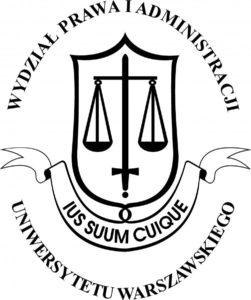PROGRAMME
24TH ANNUAL FORUM OF YOUNG LEGAL HISTORIANS
14–17 JUNE 2018, WARSAW
under Honorary Patronage of the Mayor of the City of Warsaw Prof. Hanna Gronkiewicz-Waltz
THURSDAY, 14th June
Venue: Tyszkiewicz–Potocki Palace (Pałac Tyszkiewiczów–Potockich)
16:00–16:30 – Registration desk (distribution of conference materials)
16:30 – Opening of the 24th Annual Forum of Young Legal Historians
17:30 – Keynote: Contribution by Prof. Mirosław Wyrzykowski, “Polish constitutionalism – a history lesson?”
18:00 – Contribution by dr Maria Nowak, “Between Law and Life: Constantine’s Laws on Illegitimate Children”
18:30 – Contribution by dr hab. Małgorzata Sandowicz, “Tracing Legal Norms in Ancient Mesopotamia”
19:00 – Welcoming drink
FRIDAY, 15th June
Venue: Faculty of Law and Administration (Wydział Prawa i Administracji), Lipowa 4 (street).
8:30–9:00: Morning coffee
9:00–11:00: Morning session I
- Room A3: ANTIQUITY. “Roman law in context”, chairperson: Mark Letteney (Princeton University)
İpek Sevda Söğüt (Kadir Has University, Istanbul), “Intellectual Context of Roman Law”.
Joanna Kulawiak-Cyrankowska (University of Lódź), “In Seneca we trust? On the utility of Roman declamation in the study of Roman law”.
Anna Iacoboni (Université Paris-Sorbonne), “The Legal Value of the mos maiorum in Cicero”.
Helen Tank (University of Birmingham), “Living with the rules: agency, coercion, and gender in Herodotus’ Histories”.
- Room A2: LAW AND SOCIETY UNDER TRANSFORMATION, chairperson: Jan Sowa (University of Warsaw)
Filip Cyuńczyk (University of Warsaw), “Legal formation of the societal collective memories in the Baltic States. A comparison with the other post-communist states from the region”.
Stanisław Zakroczymski (University of Warsaw), “How totalitarian experience built democratic norms? The struggle for independent judiciary in Poland. Conclusions from talks with Professor Adam Strzembosz”.
- Room 1.2: CRIME AND PUNISHMENT, chairperson: Tomasz Królasik (University of Warsaw)
Francesco Godano (Università di Bologna), “Ippolito Marsili: between the medieval text and modern practicae”.
Baptiste Bochart, (Université Panthéon-Assas), “The evolution of imprisonment as a punishment in French Law: from retention during trial to general sentence”.
Nicolas Picard (Université Panthéon-Sorbonne), “Escaping the guillotine: the gap between crimes punishable by death and effective death sentences (France, 20th century)”.
Izabella Drócsa (Pázmány Péter Catholic University Faculty of Law and Political Sciences, Budapest), “The transformation of the political crimes and its impact on the Hungarian criminal regulation at the period of interwar”.
11:00–11:30: Coffee break
11:30–13:30: Morning session II
- Room A3: “Managing a state. Managing estate”, chairperson: David Pitz (Universität Tübingen)
Mark Letteney (Princeton University), “The Codex Theodosianus in its Christian Conceptual Frame”.
Valérie Wyns (KU Leuven), “Norms and ideology in the Ptolemaic justice system”.
Aneta Skalec (Jan Długosz University, Częstochowa), “Norms and legal practice in ancient Egypt – A case study of irrigation system management”.
Marzena Wojtczak (University of Warsaw), “Legal representation of monastic communities in the light of late antique papyri – when norms meet legal practice”.
- Room A2: STATE OF LAW AND LAW CREATION. “Governance and administration of justice”, chairperson: Stanisław Zakroczymski (University of Warsaw)
Máté Pétervári (University of Szeged), “The Realisation of the First Hungarian Municipal Act Concerning to the Districts”.
Stefan Andonović (University of Belgrade), “The 1930 Yugoslavian Law on General Administrative Procedures Deadlines – Are We Faster Today?”.
Andreja Katančević (University of Belgrade), “Tax collectors as legal authorities in Medieval Serbia”.
- Room 1.2: LEGAL THOUGHT: WHEN IDEOLOGY MEETS LAW, chairperson: Filip Cyuńczyk (University of Warsaw)
Balázs Rigó (Eötvös Loránd University, Budapest), “The Norms of Patriarchalism in James II’s Political Writings and their Practice in His Reign”.
Fernando Hernández Fradejas (University of Valladolid), “The economic and legal debate of poverty in the School of Salamanca”.
Katharina Isabel Schmidt (Princeton University), “German Jurists and the Search for “Life” in Modern Legal Science, 1900-1939”.
Sebastiaan Vandenbogaerde (Ghent University), “On the crossroad of norms and legal practice: legal periodicals during the nazi-era”.
13:30–15:00: Lunch break
15:00–17:00: Afternoon session I
- Room A3: ANTIQUITY. “Contract making – norms and legal practice”, chairperson: Maria Nowak (University of Warsaw)
Marko Sukačić (J.J. Strossmayer University of Osijek), “Roman sale on approval in practice”.
Szilvia Nemes (Eötvös Loránd University, Budapest), “Sale contracts under the cover of a loan. Provincial practice vs. codified Roman Law”.
Aleksander Grebieniow (University of Warsaw), “Inheritance Contracts and Roman Law”.
- Room A2: STATE OF LAW AND LAW CREATION. “State and constitutional order”, chairperson: Andreja Katančević (University of Belgrade)
Zsófia Biró (University of Pécs), “The foundational documents of the Hungarian „Historical Constitution””.
Dawid Michalski (University of Gdańsk), “The Constitutional Norms of the Constitution of Finland”.
Gábor Bathó (National University of Public Service), “Government in action on itself”.
- Room 1.2: LEGAL THOUGHT: WHEN RELIGION MEETS LAW, chairperson: Wojciech Brzozowski (University of Warsaw)
Joost Possemiers (KU Leuven/FWO), “Theologians studying Contract Law.
A comparative introduction to both Matthew of Kraków’s and Konrad Summenhart’s ‘De Contractibus’”.
Paweł Dziwiński (Jagiellonian University, Kraków), “The papal practice of anathema and excommunication to protect ecclesiastical interests in thirteen century Poland. Case of Prince Henry the Bearded”.
Piotr Alexandrowicz (Adam Mickiewicz University, Poznań), “Application of Law in Early Modern Casuistry: the Example of Paolo Comitoli”.
Rafał Kaczmarczyk (University of Warsaw), “Islamic law and practice – legal norms under the pressure of diverse impact factors”.
17:00–17:30: Coffee break
17:30–19:00: Afternoon session II
- Room A3: ANTIQUITY. “Criminal coercion”, chairperson: Aleksander Grebieniow (University of Warsaw)
Diane Baudoin (Université Panthéon-Assas), “Norms and Legal Practice : the adulterium in Roman Empire”.
Valerio Massimo Minale (Università degli Studi di Napoli Federico II), “D. 29.5.14 (Volusius Maecianus’ De iudiciis publicis libri XIV): An Intervention of the Jurisprudence concerning the Senatusconsultum Silanianum”.
Elżbieta Loska (University of Cardinal Stefan Wyszyński), “On prosecutor’s offences in Roman criminal trial”.
- Room A2: STATE OF LAW AND LAW CREATION. “State and constitutional order”, chairperson: Jan Sowa (University of Warsaw)
Linde Declercq (Ghent University), “The advisers of the King in Belgium and their impact on constitutional law (1909-1951)”.
Martin Jarrige (Université de Lorraine), “Dauphin of Viennois : the juridical and political sovereignty on the Dauphiné by the heirs apparents of France (1349-1500)”.
Łukasz Gołaszewski (University of Warsaw), “Charges of Defamation of Marshal Piłsudski: political trials in interwar Poland”.
19:30: Cocktail with Hanna Gronkiewicz–Waltz, the Mayor of the City of Warsaw
SATURDAY, 16th June
Venue: Faculty of Law and Administration (Wydział Prawa i Administracji), Lipowa 4 (street)
8:30–9:00: Morning coffee
9:00–11:00: Morning session I
- Room A3: ANTIQUITY. “Greece and beyond”, chairperson: Valerio Massimo Minale (Università degli Studi di Napoli Federico II)
Tea Dularidze (Ivane Javakhishvili Tbilisi State University), “Information interchange and relations between Ahhiyawa and the Hittite Empire”.
Sophie Trierweiler (Université de Strasbourg), “The codification of Greek laws and its application in the emerging cities (mid-7th–6th cent. BC)”.
Jacek Grochowski (John Paul II Catholic University of Lublin), “How Greeks were buying. Remarks to comment of Gaius considering purchase contract. (Gai. 3.141)”.
Athanasios Delios (Democritus University of Thrace), “The protection of families (oikoi) under extinction by the Eponymus Archon in ancient Athens: The law and its application”.
- Room A2: STATE OF LAW AND LAW CREATION. “Negotiating the strategies for law creation”, chairperson: Jakub Pokoj (Jagiellonian University, Kraków)
Jenny Wienert (Universität Tübingen), “The act of publication. The moment “law on the books” turns into being “law in action”?”.
Omer Aloni (Tel-Aviv University Law Faculty & Rachel Carson Center for Environment and Society), “Conflicting Norms and Games of Honour: Reflections of Orientalist Perspectives in Early Israeli Law”.
Sonia Baï (Université Lille-II), “The colonial norm in Algeria or the adaptation of the metropolitan model”.
Wouter Druwé (KU Leuven/FWO), “‘Learned Law in Practice’. Consilia in the Low Countries (ca. 1500 – ca. 1680)”.
- Room 1.2: COURTS OF LAW, chairperson: Adam Moniuszko (University of Warsaw)
Juan Hernandez (Université Panthéon-Assas), “People’s Perception of Justice Administration Through Procedural Claims in Parisian Third Order’s Cahiers de Doléances (1614 and 1789)”.
Marianne Vasara-Aaltonen (University of Turku), “The Legal Reality at Finnish Nineteenth-Century Town Courts in Light of Their Cases”.
Karin Visnapuu (University of Tartu), “The role of the Supreme Court in carrying out of the Estonian Land Reform”.
Claudia Passarella (Università degli Studi di Padova), “The reform of the assize courts in Italy put to the test of real life: the difficult cohabitation between professional judges and laymen assessors”.
11.00–11:30: Coffee break
11:30–13:30: Morning session II
- Room A3: COMMERCE, LABOUR AND INSURANCES I, chairperson: Anna Klimaszewska (University of Gdańsk)
Cornelis in ’t Veld (Vrije Universiteit Brussel), “Norms and legal practice among merchants in Lyon (1700-1730)”.
Ilya Kotlyar (Tilburg University), “Bankruptcy and the “Praetorian Pledge”: the Law of the Books and the Law in Action in the Early Modern Netherlands”.
Manon Moerman & Patrick Naaktgeboren (Maastricht University), “Private partnerships in early modern Amsterdam and Antwerp”.
Jakub Pokoj (Jagiellonian University, Kraków), “Between law on the books and law in action. Counteracting speculation and usury in Poland (1918-1920)”.
- Room A2: STATE OF LAW AND LAW CREATION. “Negotiating the strategies for law creation”, chairperson: Omer Aloni (Tel-Aviv University Law Faculty & Rachel Carson Center for Environment and Society)
Wouter De Rycke (Vrije Universiteit Brussel), “Juridical discourse during the Congresses of the Friends of Peace, 1843-1867”.
Hyoung-Jin Nho (Tilburg University), “Korea as a Double-periphery in International Law (1876-1895): The Discrepancy between Treaties and State Practice”.
Amélie Verfaillie (Ghent University), “Beyond “law in the books”: Amnesty International’s diplomacy at the United Nations (1961-present)”.
- Room 1.2: MARRIAGE, FAMILY AND SUCCESSION, chairperson: Piotr Pomianowski (University of Warsaw)
Alicja Bańczyk (Jagiellonian University, Krakow), “‘Law in books’ vs. ‘law in a book’. Literary image of French divorce law after 1884 in practice on example of Bel Ami by Guy de Maupassant”.
Luisa Stella Coutinho (Universidade de Lisboa), “Bigamists in colonial Paraíba and the Inquisition: cultural practices and legal norms during the colonisation of Brazil”.
Dóra Frey (Andrássy Gyula Deutschsprachige Universität Budapest), “The influence of the rules of succession on the structure of Hungarian and German Families of Southern Transdanubia in the early 20th century”.
Katrin Kiirend-Pruuli (University of Tartu), “Constitution, reality and changes in family law in Estonia between 1918-1940”.
13:30–15:00: Lunch break
15:00–17:00: Afternoon session
Room A3: COMMERCE, LABOUR AND INSURANCES II, chairperson: Karol Muszyński (University of Warsaw)
Stephanie Annie Plasschaert (Vrije Universiteit Brussel), “From competing corporations towards communal standard contract terms: marine insurance in France and Belgium (1815-1860)”.
Sinem Ogis (Universität Augsburg), “Comparison of Marine, Life and Fire Insurance Under the Concept of Indemnification from the Sixteenth Century Onwards”.
Silvia Kristin Karmann (Universität Augsburg), “The influence of the practice of marine insurance concerning the risks on the first insurance contract legislation in France”.
Rodrigue Merlot (Université Lille-II), “The application of the 1898 French law on labor accidents to Belgian frontiers workers”.
- Room A2: STATE OF LAW AND LAW CREATION. “Negotiating the strategies for law creation”, chairperson: Sebastiaan Vandenbogaerde (Ghent University)
Imre Képessy (Eötvös Loránd University, Budapest), “The Consolidation of Hungarian Legal Practice with the Austrian Norms in 1861”.
Michał Gałędek (University of Gdańsk), “The beginning of the Polish debate on the codification of civil law following the regaining of independence in 1918”.
Anna Klimaszewska (University of Gdańsk), “Searching for national components in building own legal culture – the debate on the legal situation of women in interwar Poland”.
Marcin Łysko (Bialystok University), “Women’s participation in public life of the Second Republic of Poland (1918–1939) – norms and legal practice”.
- Room 1.2: PROPRIETARY RIGHTS, chairperson: Paweł Dziwiński (Jagiellonian University, Kraków)
Wojciech Bańczyk (Jagiellonian University, Kraków), “Entailed estate in Polish law from 16th to 20th century – preterlegal development of the institution challenging general rule of equality”.
Denes Legeza (Hungarian Intellectual Property Office, Budapest), “Mechanical (Reproduction) Right of Musical Works in the ‘Belle Époque’”.
17:00–17:30: Coffee break
17:30–19:00: General assembly of the Association of Young Legal Historians
20:00: Gala dinner
SUNDAY, 17th June
10:00 – max.15:00: Sightseeing (organised trips – upon prior choice)



